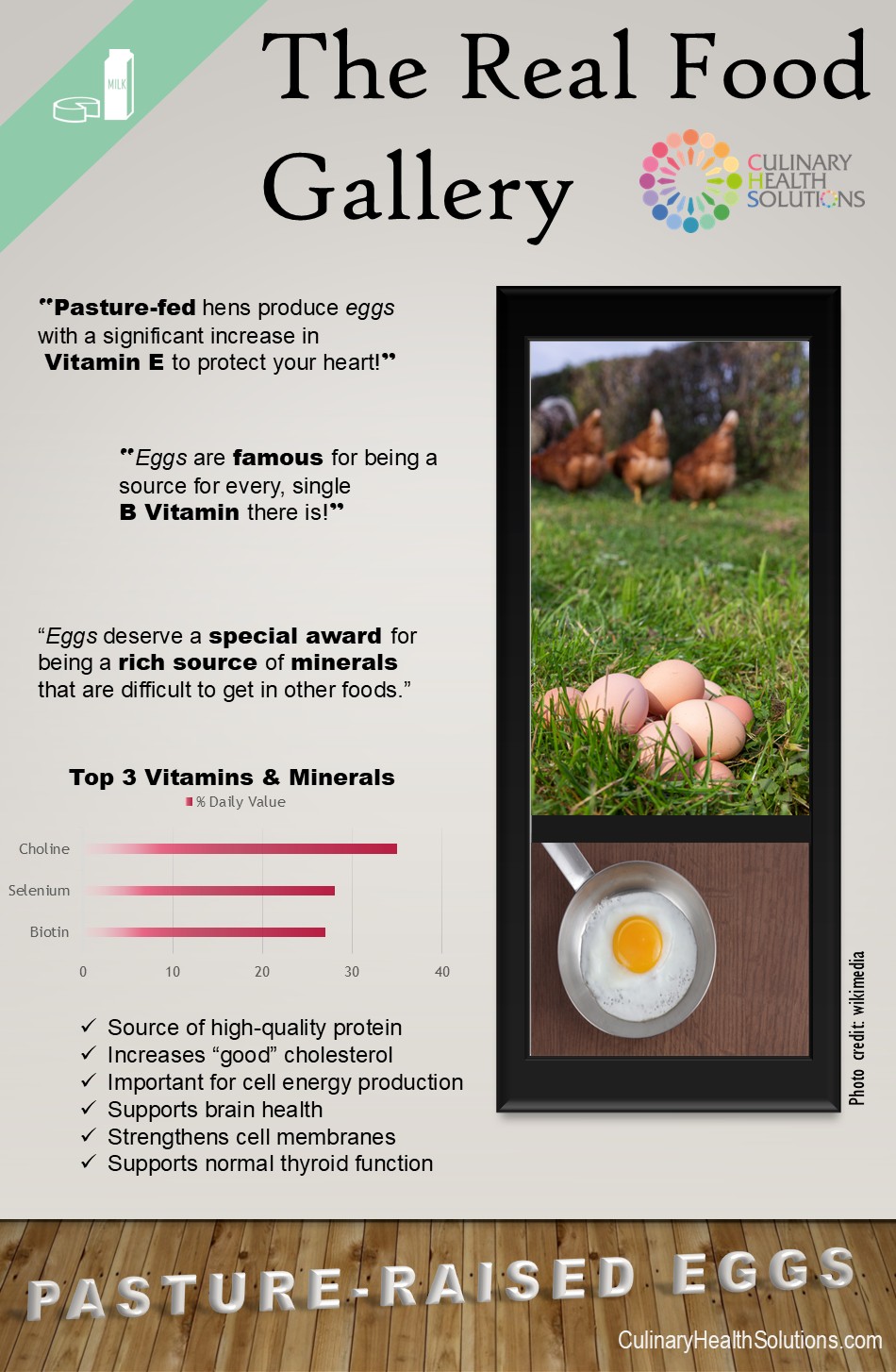Pasture Raised Eggs

Virtually all egg yolks contain omega3 fats. However, the amount of omega3s varies with the amount of foods containing omega3's that are eaten by the hen. In recent years, a marketplace trend has witnessed the development of omega3 enriched eggs through the addition of omega3 oils to the hen's feed. These oils have included menhaden oil, krill oil, flaxseed oil, and algae oil. Not surprisingly, the amount of omega3s in an egg yolk can be increased by three to five times through supplementation of the hen's diet with these oils. Eggs with as much as 250 milligrams of omega3's
per yolk have been produced in this way. While these omega3 benefits are clearly substantial, what we have been more excited to see in recent research studies is the ability of a hen's natural diet to increase the omega3s in her eggs. Unlike some approaches to omega3 enrichment that might involve the addition of processed oils to an already unnatural diet, pasture feeding approaches that offer the hen a generous amount of legumes rich in omega3s—like clover and alfalfa— make more sense to us. So it's been exciting to see studies that show significantly increased amounts of omega3's in eggs through natural pasture feeding alone.
While organizations like the American Heart Association (AHA) allow for regular consumption of eggs in a meal plan, they typically warn that eggs are difficult to include because of their high cholesterol content and potential for increasing risk of heart disease. For persons with health blood cholesterol levels not needing cholesterol lowering drugs, the AHA recommends a maximum of 300 milligrams of cholesterol per day from food. Since one conventionally produced egg contains about 180-220 milligrams of cholesterol, about two thirds of the daily limit gets used up by consumption of one
egg. Interestingly, several recent largescale diet studies suggest that the cholesterol content of an egg may be less of a concern in relationship to heart disease than previously thought. In these studies, no increased risk of either heart attack or stroke was shown with intake of one to six eggs per week. (One exception involved participants with type 2 diabetes, whose risk of heart problems was associated with egg intake, even in the range of one to six eggs per week.) Equally interesting was the link between egg intake and increased levels of HDL cholesterol (the "good" cholesterol) in
participants. Not only did egg intake increase the number of HDL molecules, it also improved their composition and allowed them to function more effectively.
Pasture feeding of hens has been shown to significantly increase the vitamin E content of their eggs. In a recent study comparing caged hens to hens foraging on grasses and legumes, vitamin E in the yolk of eggs from hens who foraged on pasture was about 200% greater than vitamin E in the yolk of eggs from caged hens. Interestingly, hens that foraged more on grasses than legumes developed about 25% more vitamin E in their eggs. Hens, of course, are omnivores and eat a wide variety of foods, including grasses, legumes, seeds, worms, grubs (insect larvae), and adult insects.
Eggs have long been recognized as a source of high-quality protein. The World Health Organization (WHO) and other public health authorities actually use eggs as their reference standard for evaluating the protein quality in all other foods. Egg protein is usually referred to as "HBV" protein, meaning protein with High Biological Value. Since eggs are used as the reference standard for food protein, they score 100% on the HBV chart. The high quality of egg protein is based on the mixture of amino acids it contains. (Amino acids are the building blocks for making proteins.) Eggs provide a complete range of amino acids, including branched chain amino acids (leucine, isoleucine, valine), sulfur containing amino acids (methionine, cysteine), lysine, tryptophan, and all other essential amino acids. Their protein is sometimes referred to as a "complete protein" for this reason.
All B vitamins are found in eggs, including vitamins B1, B2, B3, B5, B6, B12, choline, biotin, and folic acid. Choline is a standout among these B vitamins. In the U.S., an average diet provides about 300 milligrams of choline per day less than the recommended amount for an adult woman (425 milligrams) or an adult man (550 milligrams). Since one egg provides over 100 milligrams of choline and only 7580 calories, it provides far more choline for far less calories than most other choline rich foods.
The mineral content of eggs also deserves special mention here- not because eggs are a rich source of most minerals but because they are a rich source of certain minerals that can sometimes be difficult to obtain from other foods. Eggs are a very food source of both selenium and iodine. While many fish, shellfish, and mushrooms can be rich sources of selenium, persons who avoid these foods may sometimes have difficulty getting an adequate amount of this important antioxidant mineral from food. For persons who do not use iodized salt in recipes or at the table and who do not consume either yogurt or cow's milk, this mineral can also sometimes be challenging to obtain from food.
The nutrients found in an egg are distributed fairly evenly between the yolk and the white. This distribution of nutrients is a common characteristic of whole, natural foods and it is one of the reasons that we recommend consumption of whole eggs (except, of course, when only the yolk or the white is called for in a recipe).
